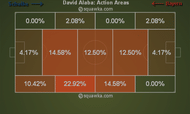Threat from the flanks
As Bayern found joy playing down the middle, the two banks of four that Schalke were organised in became narrower to deal with the threat. This in turn compressed the width of the Schalke side, giving Rafinha and David Alaba the opportunity to run down the flanks unhindered.
Bayern had the option of playing down the centre as well as on the flanks to which they made full advantage of. The third goal was an example of how Alaba was allowed to let run in the final third before squaring it to Ribery, whose mishit shot rolled into the net. Similarly, Rafinha provided overlapping runs on the right wing to give Bayern another attacking option from out wide.
Bayern’s threat on the wings wasn’t solely limited to that of the overlapping full backs though. Both Robben and Ribery were a handful for Schalke’s defence. Not only did they often cut in-field and create space for the overlapping runs of the full backs but were also eager to utilize the space behind Schalke’s defence.
Schalke’s lack of attacking prowess
Right from the onset, it was very evident that Schalke’s wing-backs were instructed to stay back and help defend rather than move up the field and provide extra support in attack. This proved quite costly in terms of attack, as it minimized their passing opinions and decreased their width.
Atsuto Uchida and Dennis Aogo both had a primary task of neutralising the Bayern wing play and focused purely on that. This left Farfan and Draxler isolated on the wings and the advantages of playing down the centre were minimal as the Bayern midfield dictated play.
With Bayern having majority of the possession (39% to Schalke), Schalke barely had the ball in any good attacking areas. In the few instances they did, they failed to string together enough passes to make proper attacking play.
Schalke were wasteful with their possession in the final third, primarily due to their urgency to get the ball forward and the lack of passing options did not help in any way. Draxler, Farfan and Boetang failed to be a prominent attacking force.
With Bayern’s attacking style and the fact that Schalke’s zonal system meant that there were no more than not two attacking players in close proximity to each other, there was no scope for them to counter-attack.
Another weapon in Schalke’s armoury which wasn’t utilised as it should have been is the pace of Farfan. Taking nothing away from Bayern’s ruthlessness, Schalke will be disappointed by the fact that they barely troubled their old team-mate Neuer.
From Schalke’s point of view, it had seemed that Schalke had turned a corner after their mid-week win. Unfortunately for them they ran into a high quality Bayern side, who can be unforgiving enemies. With seven points in six games, Schalke have some catching up to do.
Conversely, it was a satisfactory day for Bayern to say the least. They capitalised on Dortmund’s earlier slip up in an emphatic manner and are now level on points with their title rivals. There’s a long way to go yet but early signs are that this season’s Bundesliga race could well be a close one.


